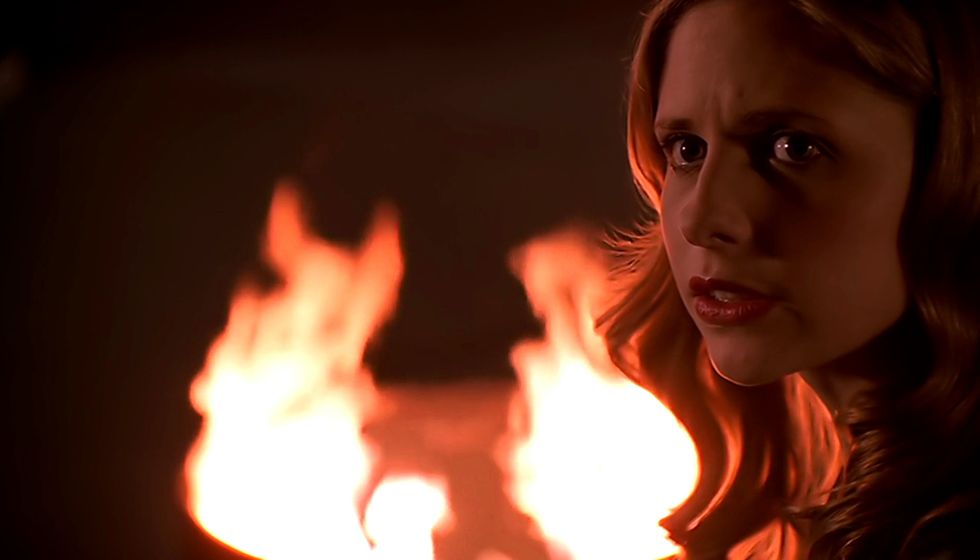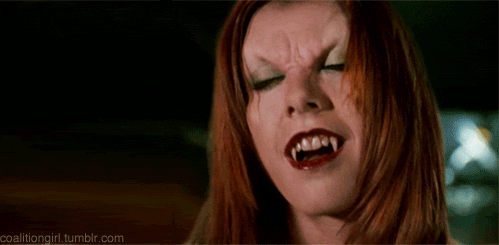In 2013, I graduated from high school, performed in my last dance recital, and my sister got sick. She had pneumonia for the second time in less than two years, and this time, it was especially bad. She’s more than fine now and going into college herself, but it took a long time for her fever to break, and for the majority of the summer, she was couch-and-bedridden, unable to do much except for drink Slurpees and watch television. Our mother told her that she was going to run out to Barnes and Noble and buy her whatever DVDs she wanted so that her recovery would feel a little less dreary. My sister made one request: “Buffy the Vampire Slayer.”
Distressed, my mother ran out to the store and bought two seasons of Joss Whedon’s cult classic television series, “Buffy the Vampire Slayer.” When she handed the DVDs to my sister, she wrinkled her petite nose and asked, “What’s this? I wanted the ‘Buffy’ movie.”
Let’s get one thing straight: No one else in the world has ever wanted a copy of the 1992 “Buffy the Vampire Slayer” movie. It’s not that the movie is even that bad, despite its reputation among “Buffy” fans. It’s that the television show overshadowed the film, so many viewers don’t even know that the film (written by Whedon) exists. And though someone eventually bought a copy of the film for my sister, she decided it would be okay if we gave the show a try.
And then the entire course of my future shifted.
When I first went into college, I was kidding myself. I told myself that because I was good at arguing and writing, and I liked history, then I should major in political science and eventually become a lawyer. It was logical, but even as I told people that those were my intentions, it felt wrong. But how could it be wrong? After a few bad run-ins with teachers in high school, I had decided that I didn’t really like to study literature anymore. If that were really true, however, I don’t think I would have felt this doubt creep over me every time I said, “I’m going to major in political science.” I ignored it. Literature is the family business, and I thought I needed to do something different. I owed it to my family to do something different.
“Buffy the Vampire Slayer” gave me the courage to study literature again. I remember that when I watched it, I made note of all the interesting metaphors that Whedon and his team of writers was using to describe the adolescent experience. In the first season of “Buffy” alone, there is a girl who turns into an invisible-almost-poltergeist because she was ignored in school, another girl whose mother performs a spell to make them swap bodies because she’s jealous of her daughter’s youth, and to top it all off, the high school itself is situation on the mouth of hell. As someone who didn’t particularly enjoy high school, I remember that I thought Whedon was a genius. I wanted to write just like he wrote. I wanted to write about what he wrote.
During my first year of college, whenever I sat down to write something creative, I made sure I followed the same formula as “Buffy.” My characters didn’t have supernatural abilities, so their motivations were entirely different, but the metaphors for rough adolescence and the quick and quirky dialogue? Those were present in clichéd spades. “Buffy the Vampire Slayer” gave me the courage to believe in my words and stories again. Without its influence, I never would have joined the staff of my school’s literary journal, published thirty-one stories and poems there, and eventually become the journal’s editor-in-chief. Creatively, I owe everything I am to “Buffy…” to wanting to be as clever as her series was. Since I was eighteen or nineteen years old, I’ve developed a more distinct style of writing, but without “Buffy,” I would have silenced my creativity and channeled it into a place that (as it turned out) made me miserable.
Actually, I probably wouldn’t have given literature another chance. When I had to register for winter classes in late 2013, I found out that because I had been exempt from the university’s foreign language requirement, I had eight additional credit hours to fill with whatever I wanted. That was the semester where I stopped kidding myself. I joined the staff of our literary journal. I took an introductory-level English class and met a guy who was, to quote Buffy Summers herself, “gorgeous in an annoying sort of way.” All that talking about literature made it hard to deny myself the truth. I didn’t want to study political science. I hated political science. It was boring and conservative. From that semester on, I studied literature. I wrote constantly. And if my mother hadn’t screwed up and bought the “Buffy the Vampire Slayer” television show instead of the movie, that would never have happened. I never would have dared to go back into the field and confirmed for myself that this was what I wanted to do. I wanted to write about books. I wanted to write about how television shows can be like books.
So I did. When I reached my senior year at the University of Michigan, I wrote a twenty-five-page article on “Buffy the Vampire Slayer” and three nineteenth-century Gothic novels, a third of which is published in this academic journal out of Nebraska Wesleyan University. Without my mother’s mistake, that wouldn’t have happened. I wouldn’t have delivered a lecture about “Buffy” to an all-freshman seminar at U of M. I wouldn’t have spoken about Bram Stoker’s “Dracula” at another university. I wouldn’t have graduated first in my degree program this spring. Most importantly, I wouldn’t be working toward a Ph.D. in English. Without “Buffy the Vampire Slayer,” I would be gearing up for an entirely different career at this time.
As I watched Buffy Summers develop the courage, strength, and skills to hunt down vampires and save the world from certain supernatural peril, she gave me the courage to write my stories and to talk about motifs and metaphors like they mattered. If “Buffy” hadn’t accidentally landed in my lap on a summer afternoon four years ago, I would be an alternate-universe version of myself. And if the alternate-universe version of me is anything like the alternate-universe version of Willow Rosenberg, I don’t want any part of her.
(Being a vampire just seems scary. And difficult.)
My talents are not useless. Fiction is not frivolous. As people of this world, we owe so much of our everyday speech, medical diagnoses, and escape tactics to fiction. I’ve always known that. But without that little blonde powerhouse with the wooden stake, I’m not sure I would have believed in myself enough to preach it.
Thanks, Buffy. You saved the world a lot. Especially my world.



















